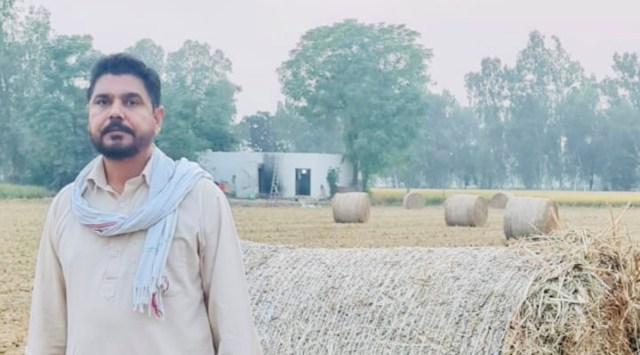Punjab: An energy company ready to pick stubble in paddy fields for free
Suba, who has sown paddy on 100 acres of land, said that the stubble will be cut and lifted from his field by a company for no cost. The company will supply the collected stubble to power and other plants which create biomass products.
 A farmer shows the paddy stubble bale ready to be picked by Ludhiana firm (Express)
A farmer shows the paddy stubble bale ready to be picked by Ludhiana firm (Express)Suba Singh, a farmer from Chak Chela village in Jalandhar, is happy that this year, neither will he have to set his field on fire after harvesting paddy, nor will he have to pay anyone to cut the stubble in his fields – this year, it will be done for free.
Suba, who has sown paddy on 100 acres of land, said that the stubble will be cut and lifted from his field by a company for no cost. The company will supply the collected stubble to power and other plants which create biomass products.
“Already, I have harvested paddy on 25 acres of land and the company has already collected the stubble…they will collect the rest once I have harvested the entire piece of land,” he said.
Suba said that earlier he was forced to burn stubble on more than half of his land, and he would mix the stubble into the soil in the remaining area, which would be a costly affair for him.
The Ludhiana-based company namely ‘Farm to Energy’ has started collecting stubble to use it to generate energy. In 2015, the company picked stubble from 900 acres of land and this year they are aiming to collect stubble from 22,000 acres of land in around 40 villages of Punjab, 18 of which are in the Doaba region.
Suba Singh said, “After harvesting, we run the repear machine which cuts stubble from close to the roots and it costs somewhere between Rs 400 to 700 per acre to run it, depending upon whether the machines are owned or on rent…then some company people come and collect the entire stubble from the field. Now that the stubble is being lifted from my fields, the expenditure of the sowing the next crop has dropped by half.” Around 1,300 acres of land in Suba’s village is under paddy and the company plans on lifting stubble from all of it.
Another farmer Bhupinder Singh of Jalandhar’s Seechewal village is also happy that he, unlike in previous years, doesn’t have to pay any money to cut stubble. “Earlier I used to pay Rs 1,500 per acre to lift the stubble from my fields and this time they (the company) have done it free of cost. I have harvested paddy on five of the 10 acres and they collected the stubble. I have even prepared my five acres to sow potato,” he said.
“We have come to Jalandhar district for the first time this year to collect the stubble and have adopted eight villages in Shahkot sub-division and 10 villages in adjoining Kapurthala district’s Sultanpur Lodhi subdivision,” said Sukhbir Singh, one of the company’s directors. Sukhbir further said they have been supplying the material to a compressed biogas plant in Sangrur, power plants apart from several people who are procuring it from us for mushroom cultivation and other purposes.
Sandeep Singh Shergill, another director of the company, said that they hold meetings with farmers before the harvest season to later collect the stubble. Sukhbir said that as per their study, crop residue, has great potential and burning it, which causes a lot of pollution, also costs the country an economic loss of USD 30 billion annually.
He said, “From straw, we can produce CBG (for transportation and industrial use), power, rostered pallets/ power for coal-based power plants, torrified pallets/ powder for coal-based power plants, ethanol/bio-diesel, biochar (fertiliser), and sustainable products…farmers are aware of the bad effects of its burning but lack of tools and knowledge to adopt alternatives is the reason why they continue to burn stubble.”
“We are not only helping to reduce stubble burning but are also generating employment for the several people who are involved in this work,” said Sukhdev, adding that the global biochar market is expected to grow from USD 1,385.94 million in 2019 to USD 3,457.61 million by the end of 2025.
He said that the company‘s vision is to shift 10 per cent of the area under paddy cultivation into fuel crop cultivation like giant grass in Punjab to create a biomass valley.







